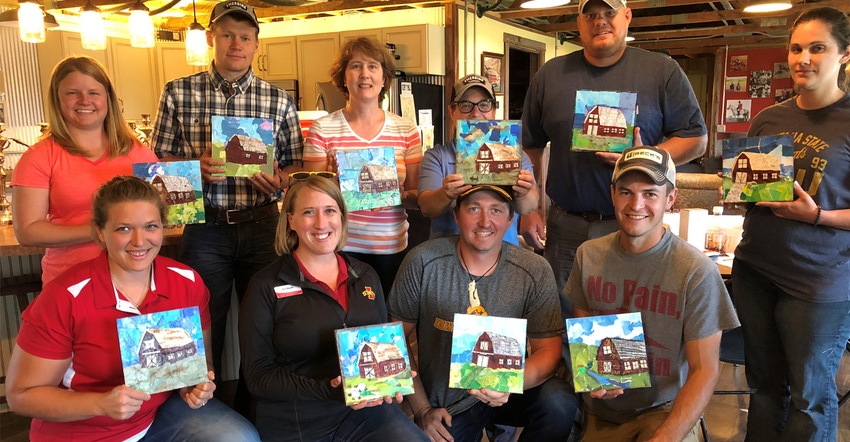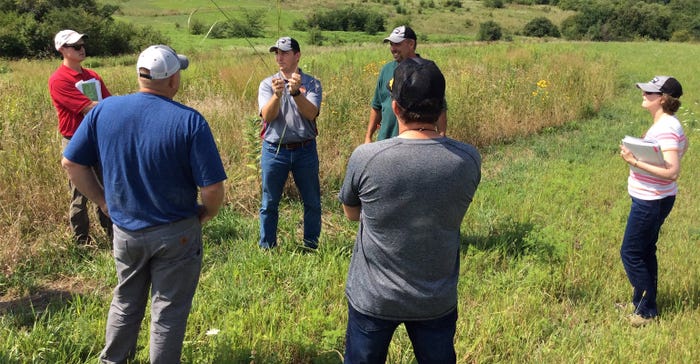May 22, 2019

By Elizabeth Juchems
Emerging farmer: Someone with ties to agricultural land who would like to return to the farm as an operator or have a voice in its management. This may include relatives or decedents of farmers or people looking to begin a farming career.
Most farmers would agree that farming is a challenging but rewarding endeavor. The rewards come not only in good years, but also in seeing a complex enterprise produce even in tough years.
For a new generation of emerging farmers, the sustainability and long-term environmental benefits of conservation farming resonate. Implementing conservation practices from the outset may add to startup complexity, but there are much larger hurdles to overcome.
In moving from idea to action, most emerging farmers are faced with multiple potential barriers to starting or taking over a farming business. Chief among these is understanding the ins and outs of running the business in an era of limited land availability, rising input costs and tight money. Other things affecting the decision to begin farming include perceptions and expectations, experience with best practices, and finding the mentors and resources to help ensure success.
Resources for emerging farmers
Iowa Learning Farms is one of many providers of advice and planning resources for emerging farmers. Its Emerging Farmer series of resources and guides is designed to help prospective farmers in developing sustainable business plans for their operations. The program also includes sustainable business plan templates and the Talking With Your Landlord series of informational publications.
In meeting with emerging farmers at seminars and field days across Iowa, ILF has seen a lot of excitement about getting into farming, but some common concerns have been expressed as well. Key among the concerns are:
Family. Family would include inheritance, co-ownership and consensus on management, or just broaching the subject.
Financial. This covers access to affordable capital, cost of inputs, rent and ownership cost inflation, commodity price fluctuations, existing debt (student loans, mortgages). and time to accumulate capital.
Land. Tight market for rental property, scarcity of land for purchase and competition with land investors are examples.
Working through the dynamics of family ownership can be complicated. To name a few concerns: Older generations are continuing to farm longer through use of advanced technology; new farmers interested in returning to a farm may be one or two generations removed from hands-on expertise; and farms divided among siblings, who may have different expectations, can sew confusion and challenge effective management.
Every situation is unique, but whether an emerging farmer is a family member or a potential renter, preparing a solid business case for operating the farm can help.
Creating a business plan
One crucial piece of advice from ILF, which is echoed by farm lenders and mentors at nearly every emerging farmer event, is to create a business plan. The plan can be for a new operation or an expansion. Understanding the expected costs and outcomes will not only help create a stronger business, but also be an influential tool in securing a lease or purchase.

GROWING IDEAS: One function of the Emerging Farmers project is to address social factors influencing adoption of conservation practices.

During a seminar held at Iowa State University, a local lender offered the following advice to emerging farmers: “Take as much accounting as you can right now. Spend one day each week in the office understanding your books, your cash flows and the financial side of your farm.”
A solid business plan can also shine a positive light on a new farm business. Emerging farmers may be burdened with school debt or simply haven’t been working long enough to save enough capital to fund a purchase. Whether approaching private lenders or applying for government-sponsored programs, farmers with solid facts and figures regarding the proposed business will have the upper hand.
Exploring ways to diversify
Diversification is another idea that can make emerging farmers more competitive. Exploring alternative cash crops or adding new lines of business that may follow different price cycles can help offset seasonal and year-to-year fluctuations seen in more saturated markets, such as corn, soybeans or hogs. However, doing the research and preparing a solid business plan should be at the root of decision-making when diversifying the operation.
Access to farmland is also a growing issue for new farmers. New rental opportunities are scarce, and individuals may be in competition with large farm operators who are looking to expand. Or, land investors may be holding acres off the market based on financial incentives. Even within families, landowners may be satisfied with existing renters and may not be willing to disrupt long-running relationships to allow a new generation to take over the farm.
Commitment to conservation
In addition, there are some negative public perceptions about agriculture — particularly linked to water quality and conservation. Committing to practices that maintain and improve the productive capacity of land through nutrient retention and erosion prevention should prove compelling to landowners.
This commitment to “land stewardship” rather than “land use” through conservation farming is a forward-looking approach that can help farmers do their part in improving water quality. However, new farmers must not just be knowledgeable about conservation practices, but also be prepared to explain the “why” and “how” to potential financers or landlords.
Entering the farming profession is challenging, and it is likely to remain so for the foreseeable future. Resources such as the Emerging Farmer series from ILF and others provided through county Extension offices and farming organizations are available to help. For those with the passion for farming and the foresight to build a new business from the outset, the outcomes can be highly rewarding.
Juchems is an Iowa Learning Farms conservation outreach specialist.
Source: ILF, which is responsible for the information provided and is wholly owned by the source. Informa Business Media and its subsidiaries aren’t responsible for any of the content contained in this information asset.
You May Also Like




